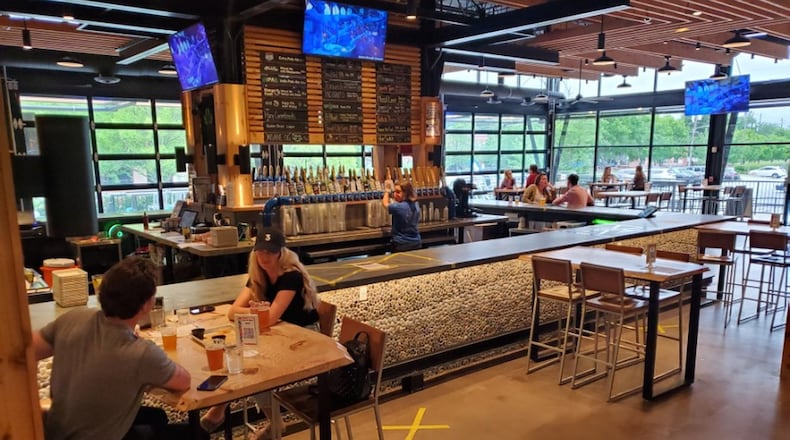The new year arrived with a heady sense of progress on Atlanta’s beer scene. Even if Georgia’s laws remained less brewery-friendly than most states, there was so much growth that longtime observers wondered whether it was sustainable.
In March, that question became a major concern, as the pandemic closed bars, restaurants and taprooms. Suddenly, everything that was so au courant a few months ago, like hyperlocal business models that primarily relied on revenue from sales in the taproom, didn’t seem so clever.
Even as draft beer sales fell to zero, bigger production breweries, such as SweetWater, Terrapin, Creature Comforts, Scofflaw and Monday Night, were able to meet the demand for increased grocery and package store sales. And, though cans were hard to come by for small breweries, six-packs of core brands, like Creature Comforts’ Tropicalia, registered record growth.
Credit: Bob Townsend
Credit: Bob Townsend
“From our perspective, restaurants and bars and taprooms still aren’t selling a ton of beer,” said Jonathan Baker, co-founder of Monday Night Brewing. “We’re selling a ton through grocery and package stores. But, because we don’t have that keg market, it’s been tougher to invest in innovation. You can’t move kegs fast enough for that to make sense.”
Looking on the bright side, Baker said that on-premises sales are coming back a bit, with bars and restaurants reopening.
Credit: Bob Townsend
Credit: Bob Townsend
And, he confirmed that Monday Night’s core beers are growing at a surprising rate. He believes customers are gravitating toward “beers that they know they love.” For the foreseeable future, Monday Night will be concentrating on core beers, and the package side of sales.
“We don’t expect things to come back much more until the second quarter of next year,” Baker said. “Even then, it’s not going to flood back, because you’re still going to have recession, which is hitting the hospitality industry really hard.”
SweetWater Brewing, which ranks among the top breweries in the U.S., celebrated its 23rd anniversary a few weeks before the pandemic hit.
First offering takeout only, the taproom and outdoor spaces reopened in May, after being reconfigured to meet state-mandated guidelines for dine-in service.
Recently, Vice President of Branding and Culture Steve Farace explained that SweetWater also has been prioritizing its core brands, including SweetWater 420 and IPA.
“Over the past two months, we’ve been working on a bunch of experimental beers geared toward late 2020 and 2021 releases,” Farace said.
“We’re fortunate to be a big enough facility that we have both a bottling line and a canning line,” he said. “That means we can get as much packaged offerings out to people as they want. We haven’t yet felt a hit from can shortages, but having the full-scale bottling line means we’ll never have a situation where we can’t get liquid into a package.”
Much like Monday Night and SweetWater, Three Taverns Brewing has benefited from increased package sales. In fact, founder Brian Purcell said the company’s best-selling sour beer, Rapturous, “blew up” during the spring and summer.
“We were just very fortunate that we had some mature brands in the market, and it accelerated from there,” Purcell said. “Right now, things are holding steady. Our new canning line, which will double the speed of our output, will be here in October, and will allow us to push out more packaged beer.”
As far as the can shortage, Purcell said it’s “a very real thing,” especially for smaller breweries. But, Three Taverns has been able to buy in volume under contract from a company that takes care of procuring and storing its cans.
Not far from Three Taverns, Robert Hopek and Stacia Familo-Hopek are having a harder time being optimistic.
The husband-and-wife owners of Lost Druid Brewery in Avondale Estates decided a brewery with a kitchen was the kind of family business they wanted to build.
Credit: Mia Yakel
Credit: Mia Yakel
But, while a 500-liter pub-style brewing system is fine for creating a variety of taproom beers, it isn’t easily adapted for a production canning line.
“We do some self-canning, but not having that visibility in stores does provide a challenge for us, for sure,” Familo-Hopek said. “When things slowed down, and we were doing takeout only, that was definitely an impact on what we were able to do each week.”
In mid-May, Lost Druid opened its patio, and slowly reopened its taproom after that. Right now, the couple is looking into ways to do more production and distribution with cans and kegs.
“We are grateful to have a large patio and taproom with garage doors that allow good airflow," Familo-Hopek said. “That’s made customers feel comfortable coming out.”
Read more stories like this by liking Atlanta Restaurant Scene on Facebook, following @ATLDiningNews on Twitter and @ajcdining on Instagram.
About the Author




